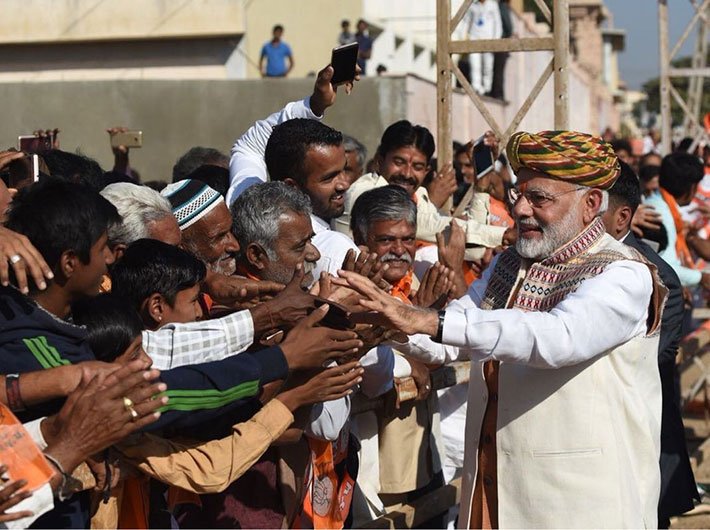Till the Congress regains emotional connect, it will make only sound and fury, signifying nothing
Familiarity, it is said, breeds contempt. But a two-decade-long association of a political party with the electorate is bound to unleash demons of contempt, jealousy and disaffection.
If one looks at confusing signals emanating from Gujarat, most of them are coming from voters’ high degree of familiarity with the BJP leadership in the state. For them, over the years, BJP leaders have practically become next-door neighbours whose proximity evokes both pride and prejudice simultaneously.
This assembly election in Gujarat is certainly not an ordinary election. After nearly two decades, Gujarat is feeling the absence of the leader who is arguably the most powerful leader the state has ever produced after Mahatma Gandhi and Sardar Patel. No doubt, his larger than life image has substantially dwarfed other leaders in the state.
In this context, the regime headed by either Anandiben Patel or Vijay Rupani is a pale shadow of the Narendra Modi government of nearly 13 years. Ever since Modi shifted to Delhi in 2014, the state government has lacked the flamboyance and innovation that were hallmarks of his style. Similarly, there are complaints of the state bureaucracy slipping back into its corrupt mode in the post-Modi phase.
At the same time, there are certain achievements on which the voters are unequivocally appreciative of Modi. For instance, Modi’s ambitious plan of holding ‘Garib Mela’ at regular intervals was believed to be a game-changer in the 2012 assembly elections. Modi’s emphasis on infrastructure is appreciated all around. But the energy that Modi displayed in connecting with the people has been found singularly missing in his successors.
So, there’s an obvious disconnect between the electorate and the BJP’s new leadership. But that’s not the only grouse. While traveling across south Gujarat, one comes across a new word in political lexicon – ahankar (hubris). At the textile market in Surat, office-bearers of the traders association say that they are unhappy with the “ahankar” of the BJP leadership. “How could they take us for granted?” Asked one office-bearer while pointing to BJP president Amit Shah’s claim that the party would win more than 150 seats. When asked if he would support the Congress, his instant reply was: “No way. We may be unhappy but we still trust Modi.”
The underlying message is clear: The new BJP leadership cannot take voters’ support for granted. Modi still remains an exception. Perhaps the party leadership belatedly understood the angst of voters and started reaching out to them in right earnest. Given the robust and dynamic organisational structure of the BJP, this swell of anger is substantially neutralised by dedicated teams of workers.
The rise of Hardik Patel is a corollary to political prejudices and zealousness that prevail in the state’s politics. A section of Patidars who see political power as their entitlement found in Modi’s absence an opportunity to assert themselves. That Hardik’s voice found resonance among the younger generation is indeed a matter of concern for the BJP.
There’s no doubt that the assembly election in Gujarat would leave an enormous scope for the BJP to set its own house in order and introspect. But it’s equally true that the BJP’s assimilation in Gujarat’s society and charisma of Modi far outweigh the transient emotional aberrations on which the Congress intends to capitalise. Till the Congress acquires the status of the next-door neighbour for Gujaratis, it will make only sound and fury, signifying nothing.
[This article first appeared on FirstPost.com.]

